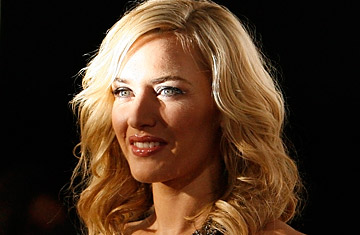
Kate Winslet
(4 of 5)
"I kept saying, 'Sam, should she really be wearing the glasses? Shouldn't I just prop them on the top of my head?' And he said, 'Absolutely not!' So I thought, Well, I trust him completely, and this is a whole new challenge--someone has taken my eyes away. But the silences are where I have learned the most about the job that I do. They're where I learn to think."
Winslet's pre-Titanic breakthrough came when she was still in her teens, in 1995's charming Sense and Sensibility. But beginning with her portrayal of Clementine, the psychedelic-haired femme semi-fatale who radiates crazy in 2004's Eternal Sunshine of the Spotless Mind, a darker, richer phase of her career began to bloom. With the 2006 drama Little Children, in which she plays a suburban mom whose fear that she is becoming a cliché propels her into an affair, and her two latest movies, her appetite for a certain kind of role--"angst-ridden women," she says, owning up to it immediately--has become unmistakable. "In her real life, she likes to keep things very simple," says Mendes. "But she's drawn to roles that seem like puzzles that need to be explored or mazes that need to be entered, even if she doesn't know how to get out."
Winslet's attraction to those roles is something of a mystery even to her. "It's a funny thing," she says. For a few seconds, her articulate, free-associative, appealingly profane conversational style deserts her. "I almost ... don't know. If I had a therapist, I'm sure they would identify it. Clearly, it's not coincidental. Do I feel trapped? No, not at all. Have I experienced feelings of serious entrapment in my life? Absolutely, yes, without question--and I haven't known that I was trapped until it's all come crashing down. And only then have I realized that there's a fire in me that won't be put out, and, my God, I can't believe I just said that! What a wanky-actor thing to say!" She sits back, unwraps a pouch of tobacco and rolls a cigarette, a habit she says she'll work on shedding after the Oscars. "I think what connects these characters is that they want to have clarity--not necessarily freedom, just the chance to take a moment and say, 'Now what do I do?'"
But that's where Winslet's identification with them ends. Playing The Reader's Hanna was, she says, "like staring down a long, dark tunnel and searching for a fleck of light at the end, but there f___ing isn't one. There was nothing of her that I could relate to. Just nothing." When Daldry approached her about replacing Nicole Kidman, who had left the project in January 2008 after becoming pregnant, "I was concerned about whether I was skilled enough," Winslet says. The nudity required for the film's sex scenes didn't unsettle her--though she now says, "I think I won't do it again: a) I can't keep getting away with it, and b) I don't want to become 'that actress who always gets her kit off.'" But she wondered if she could handle a German accent, play Hanna convincingly into old age and find a foothold in a character who exemplifies the banality of evil. "You don't have to make the audience like you. And not worrying about that makes the job much more interesting," she says. "But I did say to myself, Come on, Kate. You don't have to humanize her, but you do have to understand her."
